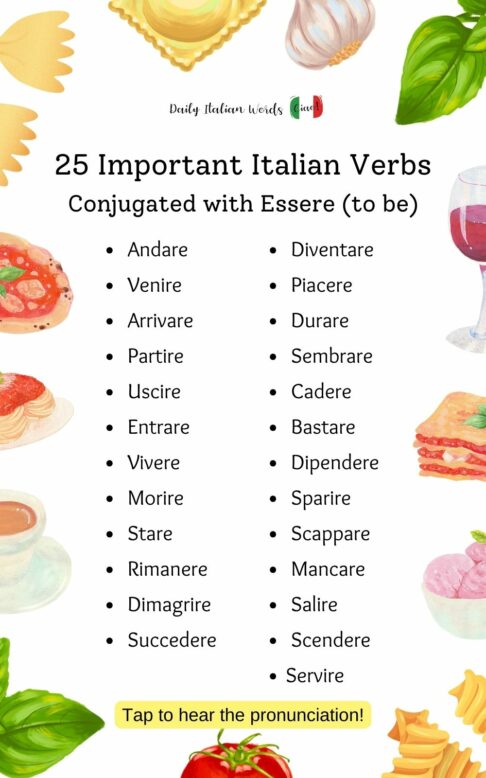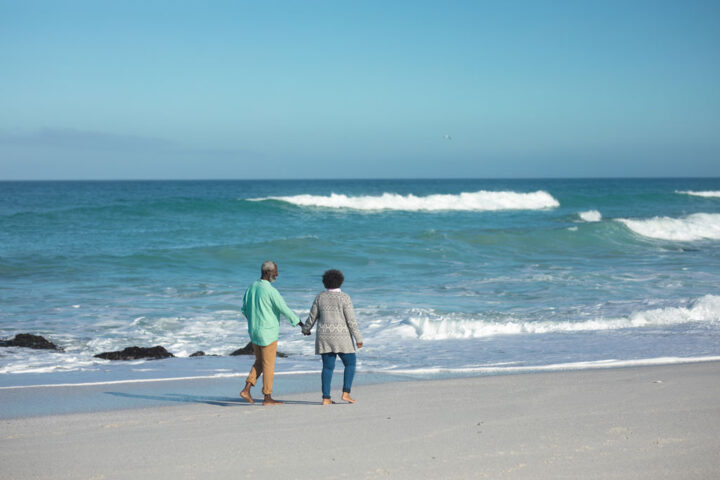Many tenses in Italian are formed by combining an auxiliary verb – either avere (to have) or essere (to be) – with the past participle of the main verb. These so-called compound tenses include the passato prossimo (present perfect), trapassato prossimo (pluperfect), futuro anteriore (future perfect), and trapassato remoto (preterite perfect).
Whether the main verb takes avere or essere as its auxiliary verb depends on a few factors:
1. As a general rule, transitive verbs in Italian always take avere whereas intransitive verbs can take essere, avere or both. Transitive verbs always require a direct object (e.g. I ate an apple = Ho mangiato una mela) whereas intransitive verbs do not (e.g. I left = Sono partito).
2. Essere tends to be used with verbs that describe motion, conditions and states of being.
3. Essere is always used with reflexive verbs such as farsi (to make oneself), lavarsi (to wash oneself), interessarsi (to interest oneself) and so on.
When the auxiliary verb is essere, it is also necessary to match the gender and/or number of the past participle to the subject. For example:
- the man went would be l’uomo è andato (ending in the singular masculine o)
- the woman went would be la donna è andata (ending in the singular feminine a)
- the men went would be gli uomini sono andati (ending in the masculine plural i)
- the women went would be le donne sono andate (ending in the feminine plural e)
Note that some verbs are both transitive and intransitive, and for this reason, may take either avere or essere as their auxiliary verb. A good example is the verb cambiare (to change) which can exist on its own or take a direct object.
- I have changed. = Sono cambiato. (intransitive – no object)
- I changed my name. = Ho cambiato il mio nome. (transitive – object)
To find out more about this topic, we suggest reading ThoughtCo’s excellent piece.
In this article, we’ve come up with a list of 25 very common verbs that take essere as their auxiliary verb when conjugated. There are of course many more, but hopefully these will get you started!

1. Andare
English meaning: to go
I bambini sono andati alla festa di compleanno.
The children went to the birthday party.
2. Venire
English meaning: to come
Mia madre è venuta con me in Italia.
My mother came with me to Italy.
3. Arrivare
English meaning: to arrive
Ormai Lucio sarà già arrivato.
Lucio will have already arrived by now.
4. Partire
English meaning: to leave
Sono partiti ieri per il loro viaggio in Spagna.
They left yesterday for their trip to Spain.
5. Uscire
English meaning: to go out, to exit
La mamma è uscita a fare la spesa.
Mum has gone out to do shopping.

6. Entrare
English meaning: to enter, to come in
La ragazza è entrata e si è seduta vicino alla finestra.
The girl came in and sat near the window.
7. Vivere
English meaning: to live
Sono vissuto a Torino fino alla fine del 2014.
I lived in Turin until the end of 2014.
Note that vivere is one of those verbs that can be used with both auxiliaries, avere and essere.
Here as well the presence of a direct object (or lack thereof) helps to determine which one to use:
- Ha vissuto una vita dignitosa = He has lived a respectable life (the direct object is the respectable life)
- È vissuto dignitosamente = He has lived respectably (no direct object)
With that said, the use of avere has expanded through the years and today, even dictionaries like Treccani state that both avere and essere are accepted (when there is no direct object). This means you’ll also hear:
- Ho vissuto a Torino fino alla fine del 2014.
- Ha vissuto dignitosamente.
8. Morire
English meaning: to die
Il signore anziano è morto nel sonno.
The old man died in his sleep.
9. Stare
English meaning: to stay, to be
Stai zitto per favore, non riesco a sentire il telegiornale!
Shut up please, I can’t hear the news!
10. Rimanere
English meaning: to stay, to remain
Sono rimasti insieme per quasi 50 anni.
They stayed together for nearly 50 years.

11. Dimagrire
English meaning: to lose weight
Hai notato quanto è dimagrito il Signor Rossi?
Have you noticed how much weight Mr Rossi has lost?
12. Succedere
English meaning: to happen
È successo tanto tempo fa.
It happened a long time ago.
13. Diventare
English meaning: to become
La bambina è diventata un’attrice famosa dopo il suo primo film.
The girl became a famous actress after her first film.
14. Piacere
English meaning: to like, to please
Sono contento che il nostro regalo sia piaciuto anche a te.
I’m glad that you liked our present as well.
15. Durare
English meaning: to last
Quanto è durato il film?
How long did the film last?

16. Sembrare
English meaning: to seem
Marco mi è sembrato più preoccupato del solito.
It seemed to me that Marco was more worried than usual.
17. Cadere
English meaning: to fall
Il gatto è caduto dal balcone ma non si è fatto male.
The cat fell from the balcony but it didn’t get hurt.
18. Bastare
English meaning: to be enough
Mi è bastato un attimo per capire cosa stava succedendo.
I immediately knew (lit: an instant was enough to understand) what was happening.
19. Dipendere
English meaning: to depend, to be caused by
L’incidente non è dipeso da me.
The accident wasn’t caused by me.
20. Sparire
English meaning: to disappear
Dove sono spariti tutti i biscotti?
Where have all the cookies gone (lit: disappeared)?

21. Servire
English meaning: to serve, to be needed
Sapevo che mi sarebbe servito più tempo.
I knew that I would need more time.
22. Scappare
English meaning: to escape
Le pecore sono scappate dal recinto.
The sheep escaped from the corral.
23. Mancare
English meaning: to miss, to lack
Mi sei mancata tantissimo in questi giorni!
I’ve missed you so much these days!
24. Salire
English meaning: to climb, to go up
Il bambino è salito su in camera.
The boy went up to his room.
25. Scendere
English meaning: to descend, to go down
Non è scesa dall’albero prima della sera.
She didn’t come down from the tree until the evening.


Heather Broster is a graduate with honours in linguistics from the University of Western Ontario. She is an aspiring polyglot, proficient in English and Italian, as well as Japanese, Welsh, and French to varying degrees of fluency. Originally from Toronto, Heather has resided in various countries, notably Italy for a period of six years. Her primary focus lies in the fields of language acquisition, education, and bilingual instruction.


